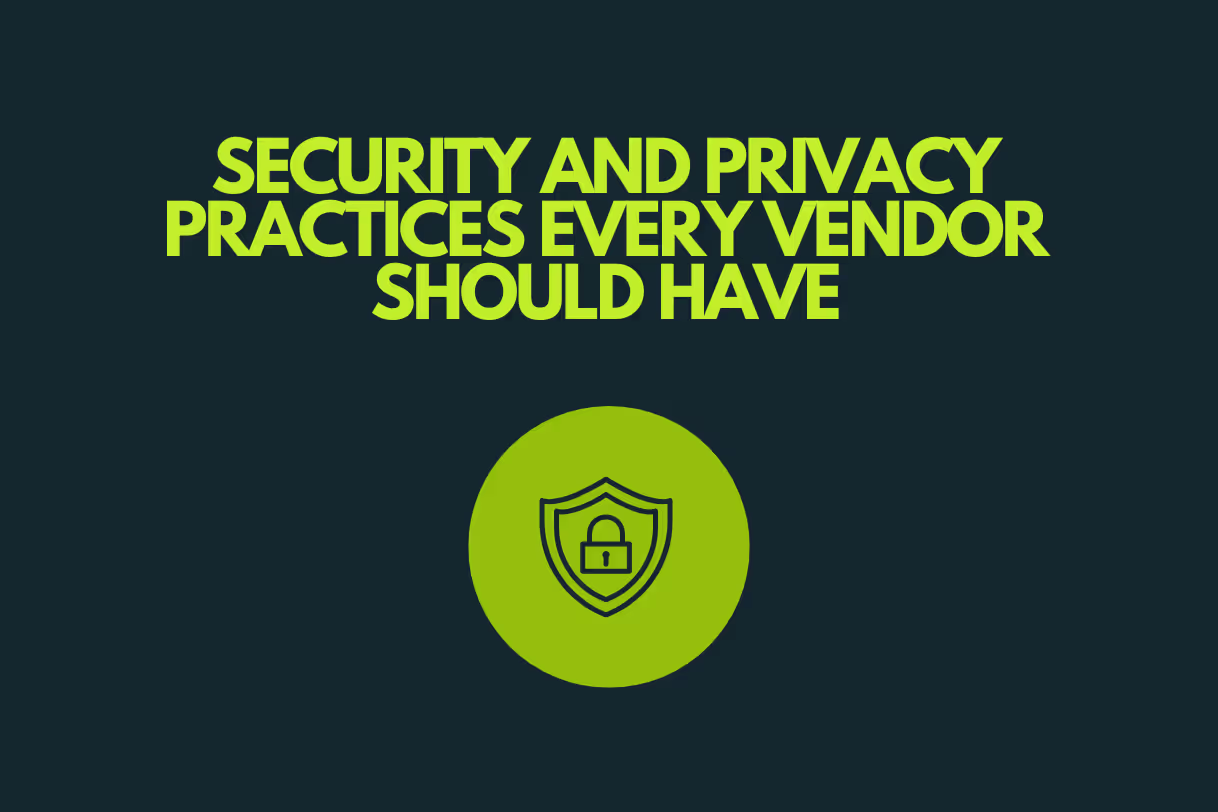
Security and Privacy Practices Every Vendor Should Have
Discover the essential security and privacy practices vendors must follow, from encryption to SOC certification, and see how sanctions.io meets the standard.
Trust is the foundation of every business relationship, especially when it comes to handling sensitive financial and compliance data. In a world of increasing regulatory obligations, sophisticated cyber threats, and heightened customer expectations, organizations can no longer afford to treat security and privacy as afterthoughts. Vendors that touch customer data must be held to the highest standards, and firms selecting partners must know exactly what to look for.
From data encryption to SOC certification, there are core practices that every vendor should have in place to safeguard information and ensure compliance. Understanding these practices helps compliance officers, risk managers, and executives ask the right questions, select the right providers, and demonstrate to regulators and clients that vendor risk is under control.
The Role of Security and Privacy in Vendor Risk
Every vendor relationship introduces a potential vulnerability. When a third-party provider has access to sensitive data—whether customer identities, sanctions screening results, or transaction histories—their controls become your controls. Regulators such as the SEC, FinCEN, and FINRA expect financial institutions to manage third-party risks with the same rigor as internal risks. That means security and privacy are not negotiable; they are foundational.
If a vendor cannot demonstrate robust protections, the risk does not just fall on them. It becomes your institution’s risk, your regulator’s concern, and your client’s fear. For this reason, evaluating vendor security practices is no longer just a procurement exercise; it is a compliance requirement.
{{snippets-guide}}
Data Encryption: The First Line of Defense
Encryption remains one of the most important tools in safeguarding sensitive data. By converting readable data into unreadable code, encryption ensures that even if information is intercepted or accessed without authorization, it cannot be understood or exploited. Vendors must use encryption both in transit and at rest.
Encryption in transit protects information as it moves across networks—whether during customer onboarding, API calls, or internal data transfers. Encryption at rest safeguards data stored in databases or file systems, preventing unauthorized access even in the event of a breach. Without both, sensitive compliance data remains vulnerable.
For financial institutions working with vendors, encryption should not be a marketing claim; it should be a verifiable standard. Vendors should be able to explain what encryption algorithms they use, how keys are managed, and how encryption practices align with industry norms such as AES-256 or TLS 1.3.
Access Control: Ensuring Only the Right Eyes See the Data
Strong access control policies are essential to prevent unauthorized individuals from viewing or manipulating sensitive data. Vendors should operate on a principle of least privilege, granting employees access only to the data and systems they need to perform their roles.
This includes robust authentication mechanisms such as multi-factor authentication (MFA), strict password policies, and regular access reviews. Vendors should also enforce role-based access, ensuring that engineers, analysts, and administrators can only reach the areas relevant to their responsibilities.
The importance of access control extends beyond internal teams. Vendors should monitor and limit access by subcontractors or external partners and provide transparency into how these relationships are managed. Without strict access policies, even the best encryption can be undermined.
Audit Logs: Creating Transparency and Accountability
Every action taken within a vendor’s system should leave a trail. Audit logs provide this record, documenting who accessed what, when, and why. For compliance purposes, audit logs are not optional—they are essential. Regulators expect firms to demonstrate accountability, and without logs, there is no way to reconstruct events or prove compliance.
Effective audit logging means more than capturing raw data. Logs must be tamper-proof, centralized, and easy to analyze. Vendors should be able to provide clients with access to relevant logs or generate reports on request, helping compliance teams investigate incidents, resolve disputes, and prepare for audits.
In practice, audit logs are the difference between guessing what happened and knowing what happened. They provide the transparency regulators demand and the accountability clients deserve.
Uptime Guarantees: Reliability as a Security Practice
Security and privacy are not only about protecting data; they are also about ensuring that critical services remain available. For many institutions, sanctions screening and compliance checks are real-time requirements. If a vendor’s system goes down, the consequences can include delayed transactions, failed compliance checks, and exposure to regulatory penalties.
That is why uptime guarantees are a critical vendor practice. Vendors should commit to service-level agreements (SLAs) that ensure availability at levels such as 99.9% or higher. They should also provide transparency into how uptime is monitored, how incidents are communicated, and how redundancy is built into their infrastructure.
Uptime guarantees demonstrate not only technical reliability but also accountability. They show that the vendor understands the operational importance of their service and is willing to commit contractually to meeting expectations.
SOC Certification: Independent Validation of Controls
While vendors can make claims about encryption, access, and uptime, independent verification matters. SOC certification provides this assurance. A Service Organization Control (SOC) report evaluates and validates a vendor’s security, privacy, and operational controls through an independent audit.
For compliance officers and risk managers, SOC reports provide objective evidence that a vendor has implemented—and is maintaining—strong practices. SOC 2 Type II reports, in particular, assess the design and operating effectiveness of controls over a sustained period, not just a point in time.
When a vendor holds SOC certification, it reduces the burden on clients to perform exhaustive due diligence themselves. It also signals that the vendor is committed to transparency and accountability, which is increasingly a differentiator in competitive markets.
Bringing It All Together: The Standard Vendors Must Meet
When considered together, data encryption, access control, audit logs, uptime guarantees, and SOC certification form the backbone of modern vendor security. Encryption ensures data confidentiality, access control ensures that only authorized users can act, audit logs provide transparency, uptime guarantees demonstrate reliability, and SOC certification validates everything through independent review.
For clients, the absence of any one of these elements should be a red flag. Regulators view vendor management as part of overall compliance, meaning firms cannot outsource responsibility for weak practices. By insisting that vendors meet these standards, organizations not only protect themselves from breaches and downtime but also demonstrate to regulators that third-party risk is under control.
How sanctions.io Meets This Standard
At sanctions.io, we recognize that compliance data is among the most sensitive information an organization handles. That is why our platform is built from the ground up to embody the practices described above. All customer data is encrypted both in transit and at rest using industry-leading standards. Access is tightly controlled through role-based policies and multi-factor authentication, and all activity is recorded in immutable audit logs that ensure transparency and accountability. sanctions.io is also SOC 2 compliant.
By meeting and exceeding these standards, sanctions.io gives clients the peace of mind that their data is secure, their compliance obligations are supported, and their vendor risk is minimized. Security and privacy are not checkboxes for us—they are the foundation of our service and the trust our clients place in us.
{{snippets-case}}
Final Thoughts
Every organization that handles sensitive financial or compliance data must hold its vendors to the highest possible standards. Data encryption, access control, audit logs, uptime guarantees, and SOC certification are no longer optional—they are the minimum threshold for trust.
By insisting on these practices and partnering with vendors that can demonstrate them, firms protect themselves from breaches, satisfy regulators, and reassure clients. At sanctions.io, we are proud to meet this standard every day, helping our clients focus on compliance with confidence that their data is safe and their systems are secure.
sanctions.io is a highly reliable and cost-effective solution for real-time screening. AI-powered and with an enterprise-grade API with 99.99% uptime are reasons why customers globally trust us with their compliance efforts and sanctions screening needs.
To learn more about how our sanctions, PEP, and criminal watchlist screening service can support your organization's compliance program: Book a free Discovery Call.
We also encourage you to take advantage of our free 7-day trial to get started with your sanctions and AML screening (no credit card is required).



